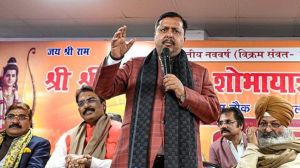The politically correct PDS
A Dalit as the the nation's first citizen: an idea so solemn and fashionable that his election sees his sole opponent's deposit being seize...

A Dalit as the the nation8217;s first citizen: an idea so solemn and fashionable that his election sees his sole opponent8217;s deposit being seized. All political parties, all the Brahmins of India8217;s social regeneration, all the card-players in our democracy8217;s backyard grow a Dalit heart. And filling this heart is a strong sense of historical requital which tells us that it would have crowned a Dalit long back, but: where was K. R. Narayanan?
Narayanan, on his own account, knows that there have been many; the idea of a Dalit as the President is a fifty-year-old pretence. quot;I am just the President,quot; he told a national magazine in reply to the nation8217;s second most current question today, that is, how does it feel like being the first Dalit President of India the first question being why is I. K. Gujral so angry?
The man in that 350-room castle is clearly embarrassed. And above him in a list of embarrassed, and at times reluctant, figureheads of our political PDS power distribution system are many: from Lord Mountbatten to Kumari Mayawati. The work of this system spreads to areas other than politics. Sports, academics, social work etc. are a few examples.
These figureheads can be put under two heads: those who were rewarded and chagrined by a unanimous decision of the predominant national idea; and those who rose to power and glory through their own effort but once successful, were appropriated by the dispensation machinery.
Let8217;s first put in a clarificatory note. Our heores who the nation chooses to honour and reward have often not been unwilling to step into glory, though they are aware that factors other than their ability might have brought it about. So being raised to power is no embarrassment. What may disconcert an able man like Narayanan is that he has been appropriated by a fashion so sweeping that it wipes out all political differences and kills the healthy concept of contest. The same pretence also requires him to feel and behave like a person who has been of great use to his community through his career.
But sorrily, this is not the case. Narayanan is as much of a Dalit as Mohammad Ali Jinnah was a Muslim or Devi Lal a peasant leader or Mayawati is a women8217;s leader. In other words, we didn8217;t do any favour or honour to the Muslims of India by appointing Mohammad Azharudin the captain of our cricket team. Nor is Irfan Habib obliged to write the history of Medieval India simply because he is a Muslim, for first and last, he is a scholar and will research, write about and excel in what interests him: no distributory mechanism has to brand him.
We made Lord Mountbatten the first non-Indian first citizen of India. The logic was as flawed as it was obsequious: he was a well-intentioned Briton who facilitated timely transfer of power. He, in return, paid rich tribute to the nation but not without compunction. If the Raj was not honoured then the Sikhs too were not when we made Zail Singh the President. The Sikhs would rather have had a Jewish President and an unbombed Akal Takht.
The moral is brief and simple: the elite of all the communities forms one disjointed creed; the beneficiaries of the PDS are also its members.
There is, however, more to this national pretence than simple fashion. It is a well-founded and insidiously unanimous mechanism to create figureheads and no actual heads of power from within the people they all know have long been wronged. This explains why they never elected a Dalit prime minister when they said we must have one. This also explains why it requires a Dalit woman to make a grotesque arrangement with Manuwadis to become chief minister. What it refuses to explain is: how long can such artifice substitute for real empowerment?
- 01
- 02
- 03
- 04
- 05































